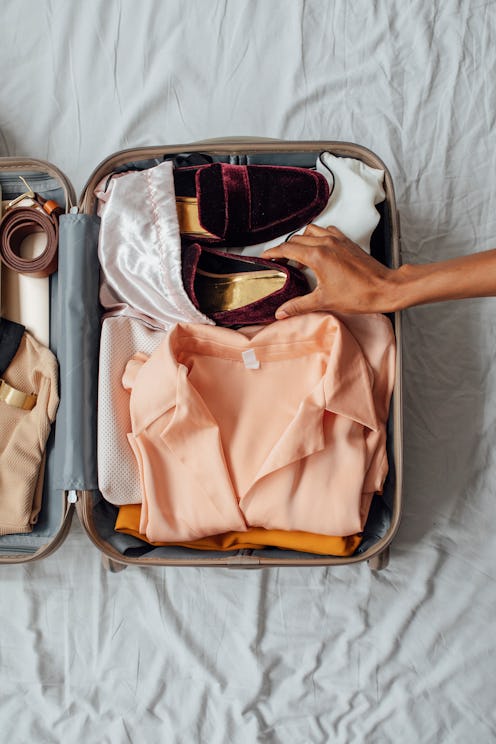Health
Everything You Need To Know About Traveling When You’re Vaccinated
Where *is* my rolly suitcase, anyway?

You’ve gotten your first COVID vaccine shot and have your second scheduled. Is now the time to book tickets to see your bestie for the first time in over a year? Before you go, you’ll want to get up to speed on the latest guidance on whether it’s safe to travel if you’re vaccinated.
What The CDC’s Guidelines For Travel Say
You’ll be fully vaccinated once you wait at least two weeks after receiving your second dose — and then the fun can begin. According to new guidelines released on March 8 by the Centers for Disease Control and Prevention (CDC), fully vaccinated people can hang out with other fully vaccinated people indoors, within six feet and without masks. Even if your friends aren’t post-second shot, the CDC says you can hug them, too, as long as they’re not at high risk for severe illness from COVID.
But that doesn’t mean you should hop on the first available flight to see your long-lost pals. The CDC has not changed its travel recommendations in light of more widespread vaccinations. Even if you’re vaccinated, the CDC’s travel recommendations remain the same: people should delay travel and stay home. That's because your vaccine status protects you, but not necessarily those around you.
“Once we are fully vaccinated, it’s unlikely that we will get sick from COVID,” Dr. Natasha Bhuyan, M.D., the regional medical director of One Medical, previously told Bustle about activities that are safe once you’re vaccinated. “However, we don’t know yet if we could get asymptomatic COVID and spread it to others — although that is unlikely per emerging evidence.”
Is Fully Vaccinated Travel Safe?
Even though the CDC advises against it, people have been getting their travel on throughout the pandemic anyway. If you’ve already got your rolly suitcase ready to go, you’ll want to mitigate travel risks as much as possible.
Dr. Bhuyan explained that you have to consider where you're going and how you're getting there if you're going to travel anyway. “The risk of travel depends on the method of transportation, regional case rates, and the mitigating strategies of the locations you are visiting,” she said. In other words, it'll be safest for the community around you if you avoid traveling altogether — but caution is still key if you do put on hard pants to leave your couch and go on a trip.
Opt for car trips with other fully vaccinated folks (whom the CDC says it is OK to hang out maskless with) rather than taking forms of public transit, since you can’t be sure of the risk you’re presenting to the people around you. Try to avoid traveling to or from an area with high COVID rates, because you might bring the virus with you (or back home).
You don’t know the risk factors or vaccination status of people walking their dog near the bus station, so protect the communities you’re traveling to, from, and through by using extra caution to mask up and maintain your distance in public.
What Are Vaccine Passports?
When it is safe to travel like it’s 2019, some experts are suggesting people start using “vaccine passports.” Some companies, airlines, and countries are thinking of developing these digital "proof of vaccination" documents that could clear you for travel to countries that are currently closed to travelers from the United States. Currently, if you absolutely have to travel to foreign countries, you often are required to quarantine for at least seven days on top of testing negative upon return, in addition to different international quarantine and testing requirements. Though they don’t exist yet, vaccine passports could eliminate those hurdles and make traveling feel much more like it did in the before times.
On Feb. 5, the World Health Organization (WHO) made a statement saying that not enough was known yet about the potential for asymptomatic transmission post-vaccination to safely make vaccine passports the standard for approving international travel. And the White House said on March 9 that the private sector and nonprofits might develop vaccine passports, but the government is just going to focus on the logistics of actually getting people vaccinated. In other words, if you’re gearing up for a domestic trip, don't pack your international bags just yet.
This article was originally published on